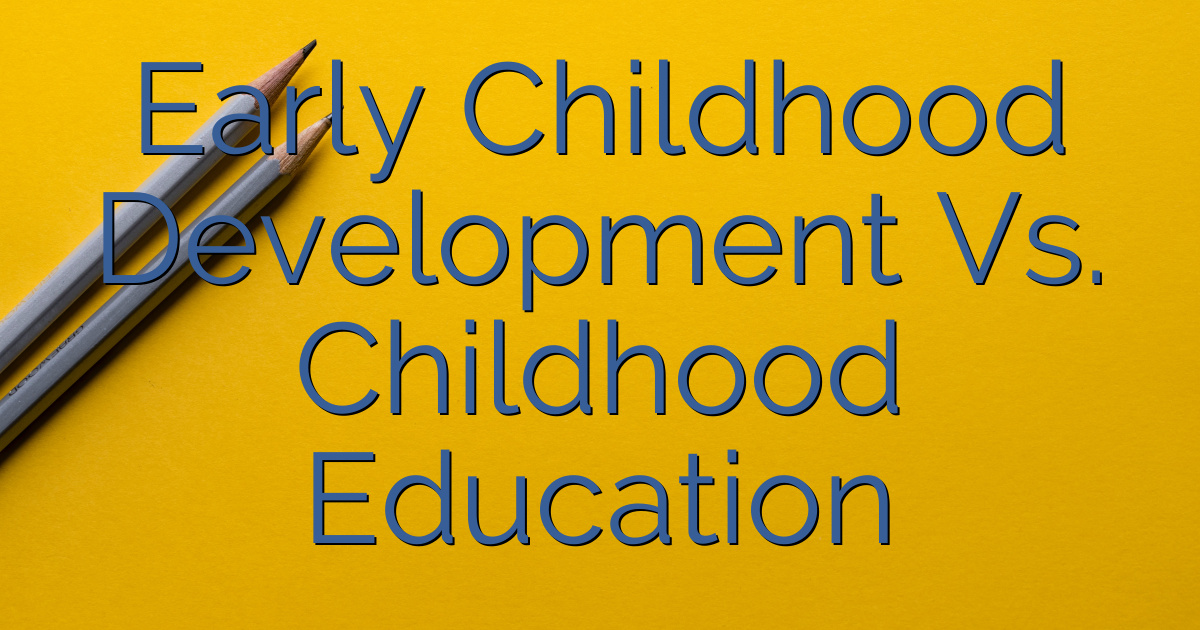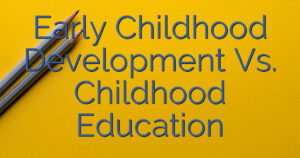 Are you torn between pursuing a major in Early Childhood Development or Childhood Education? Both fields offer exciting opportunities to make a positive impact on young minds, but it’s important to understand the differences and similarities.
In this article, we will explore the curriculum, skills developed, career opportunities, and salary potential in both majors. By examining these factors, you can make an informed decision that aligns with your interests and goals.
Let’s dive in and compare Early Childhood Development and Childhood Education!
Are you torn between pursuing a major in Early Childhood Development or Childhood Education? Both fields offer exciting opportunities to make a positive impact on young minds, but it’s important to understand the differences and similarities.
In this article, we will explore the curriculum, skills developed, career opportunities, and salary potential in both majors. By examining these factors, you can make an informed decision that aligns with your interests and goals.
Let’s dive in and compare Early Childhood Development and Childhood Education!
Table of Contents
Key Takeaways – Early Childhood Development Vs. Childhood Education
- Early Childhood Development and Childhood Education are closely related majors that focus on the early years of a child’s life and their growth and development.
- Career opportunities in Early Childhood Development include child development specialist and program coordinator, while career opportunities in Childhood Education include preschool teacher and curriculum developer.
- Both majors emphasize the importance of play in a child’s learning and development.
- Both majors offer rewarding career prospects.
Overview of the two majors: Early Childhood Development and Education
Early childhood development and education are two distinct but closely related majors. As a student in either field, you will gain a deep understanding of the early years of a child’s life and the best practices for their growth and development. In terms of career prospects, both majors offer a wide range of opportunities. With a degree in early childhood development, you can work as a child development specialist, early interventionist, or even a program coordinator. On the other hand, a degree in childhood education can lead to careers as a preschool teacher, elementary school teacher, or curriculum developer. Regardless of the path you choose, both majors emphasize the importance of play in a child’s learning and development. Through play, children explore their environment, develop social skills, and enhance their cognitive abilities. Understanding the significance of play is essential for professionals in both early childhood development and education fields, as it forms the foundation for a child’s overall growth and success.Overview of the curriculum and requirements of the two majors
The curriculum and requirements of the two majors in childhood development and education are quite different. Understanding these differences is crucial in choosing the right path for your career. Here is a comparison of the curriculum of both majors:- Early Childhood Development: This major focuses on the cognitive, emotional, and physical development of children from birth to age eight. The curriculum includes courses in child psychology, early literacy, language development, and child assessment.
- Childhood Education: This major prepares students to become teachers in elementary schools. The curriculum includes courses in educational psychology, curriculum planning, teaching methods, and classroom management.
Overview of coursework, assessments, and teaching methods
To understand the coursework, assessments, and teaching methods in both majors, you’ll find that they are tailored to equip you with the necessary skills and knowledge for your future career in childhood development and education. In early childhood development, coursework approaches focus on understanding child growth and development, play-based learning, and creating inclusive and supportive environments. You’ll explore topics like cognitive development, language acquisition, and social-emotional development. Assessments in this field often involve observing and documenting children’s progress, conducting developmental screenings, and using standardized assessments. On the other hand, childhood education majors focus on teaching strategies, curriculum design, and classroom management. Coursework includes subjects like literacy instruction, math education, and educational psychology. Assessment techniques in this field involve evaluating student understanding through tests, projects, and portfolios. Both majors prioritize hands-on experiences, internships, and practicums to apply theoretical knowledge in real-world settings.Comparison of Skills Developed: Cognitive Development
In both majors, you will develop a deep understanding of how cognitive development impacts learning and growth. When comparing language development in early childhood development and childhood education, you will find that both majors focus on providing opportunities for children to develop strong communication skills. Here is a comparison of the skills developed in the two majors:- Language Development: Both majors emphasize the importance of language skills and provide strategies for promoting language development in young children.
- Social Emotional Development: Both majors recognize the significance of social and emotional development and provide guidance on creating a supportive and nurturing environment for children.
- Cognitive Skills: Both majors aim to enhance children’s cognitive abilities, such as problem-solving, critical thinking, and decision-making skills.
- Literacy Development: Both majors emphasize the importance of literacy and provide techniques for fostering early literacy skills in children.
Comparison of Career Opportunities and Job Roles: Teaching
When considering a career in teaching, you’ll have various job roles and opportunities available to you. Teaching is a rewarding profession that allows you to make a positive impact on the lives of young learners. Whether you choose to work in early childhood development or childhood education, there are different teaching methods and salary potential to consider. In early childhood development, you may find yourself working as a preschool teacher, where you’ll focus on nurturing young children’s social, emotional, and cognitive skills. On the other hand, in childhood education, you can become an elementary school teacher, where you’ll teach a wide range of subjects to students in grades 1-6. To give you a better understanding of the job roles and salary potential in teaching, here is a table that compares the two:| Job Role | Early Childhood Development | Childhood Education |
|---|---|---|
| Preschool Teacher | Focus on nurturing | N/A |
| Elementary School Teacher | N/A | Teach various subjects |
Comparison of Salary Potential: Job Market
The salary potential in the job market for teaching can vary based on factors such as location and experience. When it comes to job satisfaction and career growth, teaching can be a rewarding profession. According to research, the average salary for teachers in the United States is around $60,000 per year. However, this can vary significantly depending on the state and district you work in. For example, teachers in states like New York and California tend to earn higher salaries compared to those in other parts of the country. Additionally, experience plays a crucial role in salary growth. As you gain more years of teaching experience, you can expect your salary to increase. This, coupled with opportunities for career advancement, makes teaching a promising field for those who are passionate about education and enjoy working with children.Similarities between Early Childhood Development and Education Curriculum
To gain a deeper understanding of the similarities between early childhood development and education curriculum, you should explore their shared focus on fostering cognitive and social-emotional growth in young learners. Both areas prioritize the following:- Developmental milestones: Both early childhood development and education curriculum recognize the importance of meeting age-appropriate milestones in various areas such as language development, fine and gross motor skills, and social interactions. This ensures that children are progressing in a healthy and balanced manner.
- Play-based learning: Both early childhood development and education curriculum emphasize the significance of play in a child’s learning journey. Play allows children to explore, experiment, and develop their creativity, problem-solving skills, and social interactions. It provides a hands-on and engaging approach to learning, which is essential for their overall growth and development.
- Individualized instruction: Both early childhood development and education curriculum understand the importance of tailoring instruction to meet the unique needs and abilities of each child. By recognizing and addressing individual strengths and challenges, educators and caregivers can provide the necessary support and guidance to help children reach their full potential.
Difference between Early Childhood Development and Education majors
If you’re considering a major in Early Childhood Development or Education, it’s important to understand the key differences between these two fields of study. While both majors focus on working with young children, they differ in their primary focuses and career opportunities. Early Childhood Development majors primarily focus on the physical, social, and emotional development of young children. They learn about child psychology, behavior management, and how to create a nurturing environment for children to thrive in. On the other hand, Childhood Education majors primarily focus on teaching and curriculum development. They learn how to design and implement educational programs and strategies to enhance cognitive development in children. The career opportunities for Early Childhood Development majors include working in child care centers, preschools, or as child life specialists. Childhood Education majors, on the other hand, can work as teachers in elementary schools or pursue careers in curriculum development or educational administration.Factors to consider when choosing between the two majors: interests
When choosing between the two majors, it’s important to consider your personal interests. Here are four factors to consider when making this decision:- Job Prospects: Research the job market for both majors to determine which one offers better career opportunities. Look at the demand for professionals in early childhood development and childhood education and consider the growth potential in each field.
- Personal Values: Reflect on your own values and beliefs. Which major aligns more with your passion for helping children learn and grow? Consider the educational philosophies and approaches that are emphasized in each major and choose the one that resonates with you.
- Skill Set: Assess your own strengths and weaknesses. Think about the skills and abilities required for each major and determine which one aligns better with your natural talents and interests.
- Long-term Goals: Consider your long-term career goals. Which major will better prepare you for your desired career path? Think about the specific roles and responsibilities you envision for yourself in the future and choose the major that will provide you with the necessary skills and knowledge.
How Does Early Childhood Education Differ from Elementary Education in terms of Child Development?
Early childhood vs elementary education differ in the approach to child development. Early childhood education focuses on play-based learning and social-emotional development, while elementary education emphasizes academic skills and critical thinking. Both are crucial stages in a child’s development, providing essential foundations for future learning and success.

